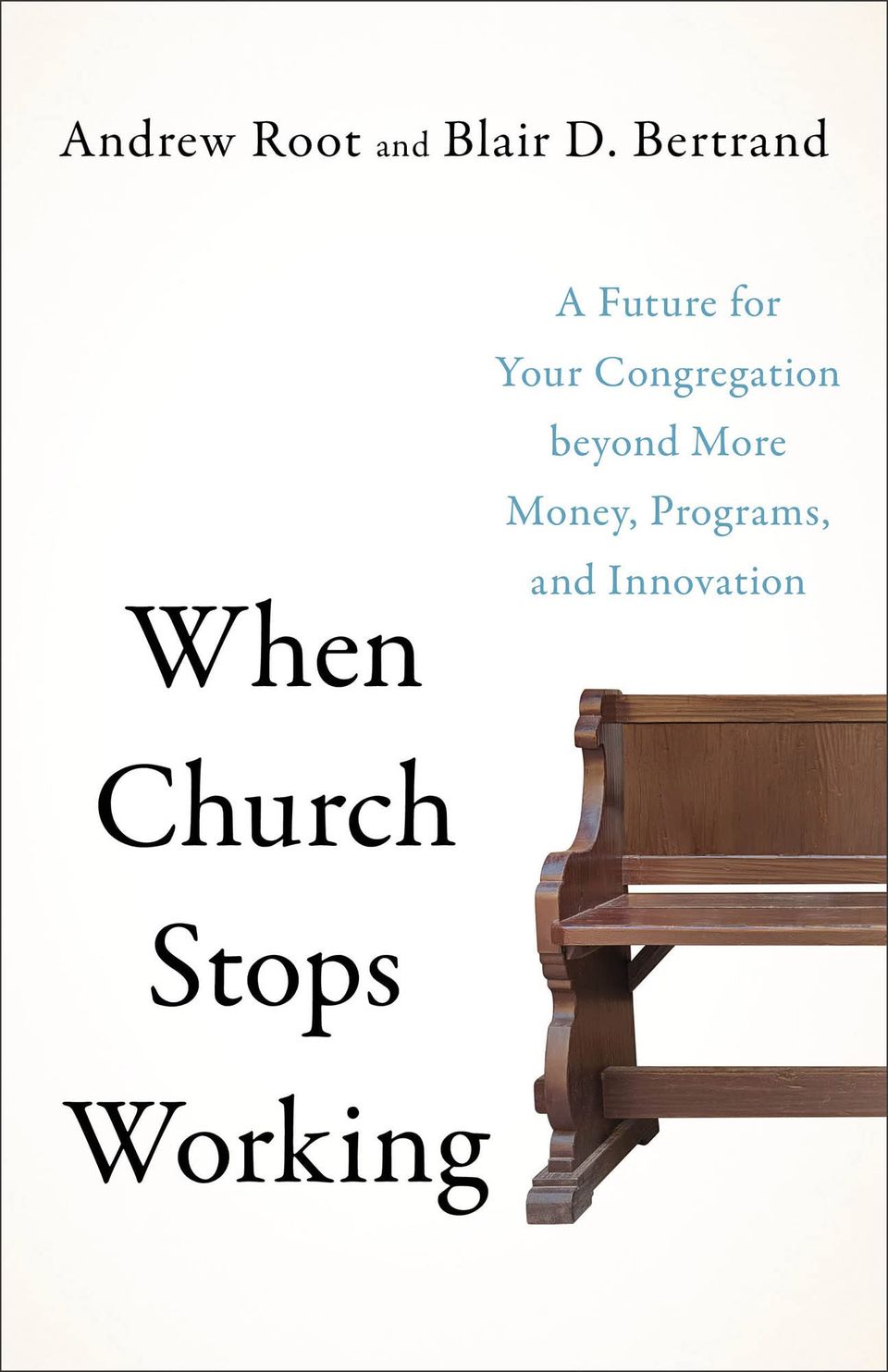When Church Stops Working

Constant growth and expansion are the hallmarks of success in the 21st century. If your church hasn't seen double-digit increases in membership, if you're not planning a 20,000 square foot expansion to your building, if you're not planting a new 1,000-seat campus every year, you must be doing something wrong. Right? Not so, claim Andrew Root and Blair Bertrand, the authors of When Church Stops Working: A Future for Your Congregation Beyond More Money, Programs, and Innovation. They suggest that calm, steadfast witness in response to God's movement might just be a suitable alternative to the boom-or-bust model of church.
From the publisher's blurb:
What if the solution for the decline of today's church isn't more money, people, programs, innovation, or busyness?
What if the answer is to stop and wait on God?
In When Church Stops Working, ministry leaders Andrew Root and Blair Bertrand show how actively watching and listening for God can bring life out of death for churches in crisis today. Using clear steps and practices, they invite church leaders to stop the endless cycle of doing more and rather to simply "be" in God's presence. They tell the story of two congregations who did this--and found new life in the process.
When Church Stops Working distills the core themes of Root's critically acclaimed Ministry in a Secular Age series in a more accessible form. Leaders and churchgoers who are burned out and hopeless will experience affirmation, encouragement, and empowerment as Root and Bertrand turn to the book of Acts as well as examples from contemporary congregational life to show what "active" waiting looks like and the saving grace it can hold.
Andrew Root is the Carrie Olson Baalson Professor of Youth and Family Ministry at Luther Seminary, USA. He writes and researches in areas of theology, ministry, culture and younger generations.
Blair Bertrand is a lecturer at Zomba Theological University, teaching consultant with Theological Education by Extension Malawi, and adjunct lecturer at Tyndale University, Toronto. He has served various Presbyterian Church in Canada congregations as an ordained minister and lives in Ottawa, Ontario.
Andrew Root has written quite a few, much heftier, books on congregational change and management over the last decade or so. I haven't spent too much time with those volumes but this book is marketed as an attempt to distill all of that work into something accessible and digestible by the average person sitting in a pew on Sunday morning.
Root and Bertrand describe some of the more prevalent features of "management" in our society. The perceived need for constant growth, always more, and the need to be frantically busy at all times. They also describe these as lethal to the Church. In a world where objective truth has all but been abandoned, experience is governed entirely by personal feelings, and the community has been almost completely eclipsed by the individual, Root and Bertrand claim there is a better way for the Church to be.
The Church is not a Fortune 500 company and it should not seek to behave like one. Rather, the Church should focus its energy on God. Funny, that. A return to the relationship with God is a calm and steady theme throughout the book. Root and Bertrand are certain that God continues to speak to us through sacrament, scripture, prayer, learning, and ministry. They are persuaded that we can, again, learn from the liturgies and calendars, rhythms and patterns of our traditions. There is no call here to a radical reformation of the Church such as we saw tried 500 years ago, but rather a reminder that we have an alternative model of how to be as church.
This book is not a series of tips and tricks for reviving a declining congregation. Nor is it a step-by-step manual to successful stewardship campaigns or anything like that. Rather, it is a persuasive suggestion that our calling as 21st century Christians may be to live in smaller, calmer, more intentional communities than we have done for many generations.
So many of the recent books I've read on theology and congregational development have been focused squarely on American Evangelical models. This book was a welcome relief from that track and even includes several references to the realities of church in Canada, courtesy of Dr Bertrand. What a lovely change!
Some of the assumptions about church were still unhelpful for me. The book is written primarily with certain varieties of Protestantism in mind. For me - and I suspect for many Anglicans and Roman Catholics - some further conversation about how sacraments, especially Eucharist, and structured forms of prayer like the Divine Office would have been most welcome. No book can address all people in all circumstances. if my most substantial critique is that I wish there were more of it, I think that's a sound recommendation.
In summary, I think When Church Stops Working is a well-written, accessible, refreshing entry into the field of congregational development. Its focus on spirituality, relationship, and God certainly speaks to me and the challenges and opportunities I see in my parish, diocese, and church. This could make for an excellent book study for clergy groups, parish councils, or entire congregations. I hope that this book will be widely read and its ideas discussed by people in every order and ministry of the Church.
Thank you to Brazos Press and NetGalley for furnishing me with a copy of this book in exchange for an honest review.





